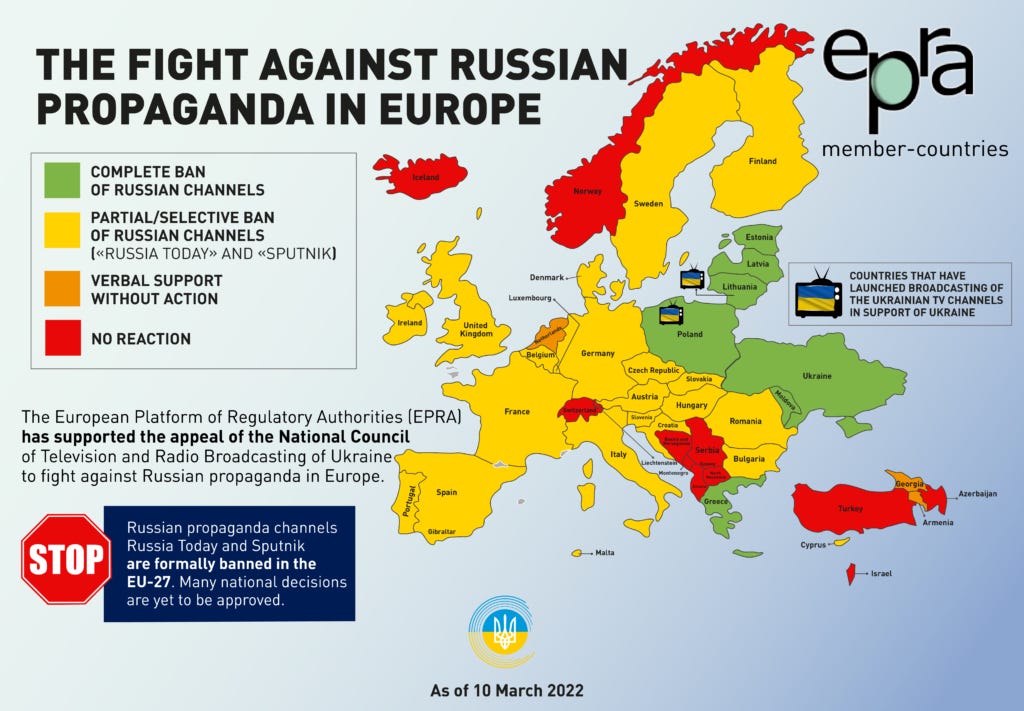Ukrainian defensive democracy
Why banning political parties isn't always a bad idea
Ukraine plans to ban 11 opposition parties, President Volodymyr Zelenskyy said in a video released last week.
“Given the full-scale war waged by the Russian Federation and the ties of some political structures with this state,” Zelenskyy said, “any activity of a number of political parties during the martial law is suspended.”
Zelenskyy, who has become a paragon of democratic leadership in the eyes of many since Russia’s invasion began on February 24, is now being criticized by some as anti-democratic.
The media ban targets anti-war parties, critics say, and bypasses parliamentary procedure to outlaw the only parties that truly stand for the people—socialist parties—while continuing to vaunt the achievements of neo-Nazi groups such as the Azov Battalion, Svoboda, Right Sector and the Social-Nationalist Assembly (SNA).
To be clear, these groups are in fact neo-Nazi but they also happen to be anti-Russia and, author Lev Golinkin argued in a 2015 opinion piece for Politico, “these battalions distinguished themselves by fighting in the hottest engagements” and as a result, “what began as neo-Nazi street gangs evolved into the best fighters in the country.”
Ukraine’s Nazi problem goes all the way back to Ukrainian independence hero, white supremacist and Nazi spy Stepan Bandera, who declared Ukrainian statehood in 1941 (and was sent to the Sachsenhausen concentration camp the very next year).
The Nazis used Ukrainian independence fighters in their battle against Russia while they themselves used Nazi support in their battle for freedom. He may have hated Jews, but he hated Russians more and for many Bandera fans today, that’s the salient feature of his legacy.
Nazis were not simply racist but extremely nationalist, hence the name of course (“Nazi” is short for “national”), as well as anti-communist. So for a people looking to assert their own nationality against an oppressive communist nation, Nazi politics had a certain appeal.
The antisemitism wasn’t a detraction either. Some of the worst pogroms in European history took place in Ukraine. There were the Odesa pogroms of 1821, 1859, 1871, 1881 and 1905. Not to mention the Kyiv pogroms of 1905 and 1919. In his book “A Century of Ambivalence,” University of Michigan political science professor Zvi Gitelman estimates that from 1918-1919 there were over 1,200 pogroms in Ukraine, “the greatest massacre of Jews in Eastern Europe since 1648.”
What happened in 1648? Cossacks slaughtered up 100,000 civilians, mainly Jews, in the Khmelnytsky massacre. And yes, this too was in Ukraine.
But while the Ukrainian right has roots that are both Nazi and nationalist, the roots of the Ukrainian left are just as offensive because they are exactly the opposite—communist and colonialist. And when I say “colonialist,” I don’t mean that they favored expanding Ukraine. I mean they favored being colonized by Russia.
Back to Zelenskyy’s ban, while this does warrant some concern about autocratic creep, I do not yet consider it a problem nor even anti-democratic, and there are three main reasons for this.
First, the banned parties are Opposition Platform - For Life, Shariy Party, Nashi, Opposition Bloc, Left Opposition, Union of Left Forces, State, Progressive Socialist Party of Ukraine, Socialist Party of Ukraine, Socialists Party and Volodymyr Saldo Bloc. That last one, for example, is named after Russia collaborator Vladimir Saldo, who supported the Russian occupation of Kherson.
If you're at war with Russia, you'd be a fool to continue to air Russian state propaganda as if it’s news simply because the Kremlin calls it “news.” In fact, I would argue that press freedom should not be extended to autocratic state propaganda even in peacetime. As for political parties, same rules apply. To do otherwise is to fail to recognize that these are not really journalistic or political entities in any meaningful sense, but instruments of war. And you have to raise your shield.
Second, it isn’t peacetime anyway. This is a war and in a war even authentic media organizations and political parties may be restrained in certain ways to ensure victory. This goes back to philosopher Karl Popper’s paradox of tolerance. Namely, if a completely tolerant society tolerates even intolerance, it therefore ceases to be a tolerant society.
Similarly, if a democratic society allows even anti-democratic freedoms, such as collaborator political parties or propaganda media, it will soon cease to be a democratic nation. If it loses the fight, it will cease to be a nation at all. This is what the Germans call streitbare Demokratie (“battle-ready democracy”) or what we simply refer to in English as “defensive democracy.”
Third, Ukraine isn’t exactly the only country restricting media. Russia of course is already banning not just state media but anything and everything it doesn't like, even all sorts of social media.
And it's not like he's the only European nation to ban Russian propaganda. Most have, in fact. And it's def not like Russia isn't already restricting or banning not just state media but anything and everything it doesn't like, even all sorts of social media: Facebook, Instagram, Twitter, the BBC, Deutsche Welle and more.
But Russia is a dictatorship so that’s not exactly surprising. However, most of the liberal democracies of Europe have also decided to ban Russian media, according to a March release by the European Platform for Regulatory Authorities (EPRA).
So if Zelenskyy didn't issue this ban, then the one country whose people are being slaughtered by Russia would be one of the very few countries left still airing Russia's claim that it's only acting in self-defense.







